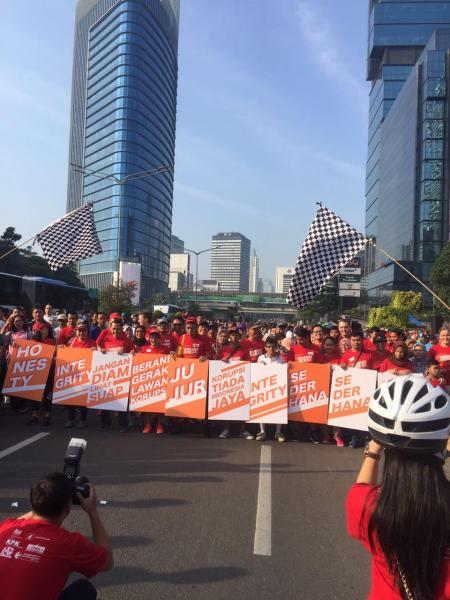Indonesia’s Anti-Corruption Commitment Remains Strong

Eradication of corruption necessarily requires the commitment of the state organizers. Although there are many actors in the fight against corruption, the government's commitment as the center of the source of policies and direction of eradicating corruption must be measurable.
Of course there are many ways of measuring the strength of the commitment to eradicate corruption. One of them is to see how many commitments have been fulfilled or implemented as a condition to the criteria of a succesful country in terms of eradication of corruption.
Referring to the London Anti-Corruption Summit (LACS) held in 2016, the countries present at the time were required to carry out several anti-corruption commitments. A similar event, the International Anti-Corruption Conference (IACC), will be held in Copenhagen on 22-24 May 2018. The two-year period is sufficient to review the anti-corruption commitments of the participating countries.
In relation to that, on Wednesday, 2 May 2018 at the British Embassy in Jakarta, Indonesia Corruption Watch together with Transparency International Indonesia held a discussion entitled "Evaluation of Indonesia's Achievement of International Anti-Corruption Commitments".
Moazzam Malik, the United Kingdom’s ambassador to Indonesia, claimed that Indonesia is one of the best countries in fulfilling the LACS 2016 commitment. Indonesia is considered to have fulfilled 17 out of 19 commitments. The fulfilled commitments include regulations relating to Whistle-Blowing System (WBS), Beneficial Ownership (BO), and in connection with procurement in the public sector. According to TII Secretary General Dadang Trisasongko, there remains 16% of Indonesia's commitments that are not yet implemented. These remaining commitments not yet executed by the Indonesian government are those about beneficial ownership registry to be accessible to the public.
In the UK, data on Beneficial Ownership have been registered and made accessible to the public. Until now the data have been accessed 2 billion times. The UK will assist Indonesia to implement public access to Beneficial Ownership (BO) data.
Bimo Wijayanto from the Office of the Presidential Staff, representing the Indonesian government, said that the fulfillment of the commitment was contributed by, among other things, the creation of several rules such as Presidential Regulation No. 13 of 2018 on Beneficial Ownership, Presidential Regulation No. 16 of 2018 on Procurement of Government Goods/Services, Governmental Regulation in lieu of Law No. 1 of 2017 on Automatic Exchange of Information (AEOI). Also contributing are the development of information-sharing facilities between public-private sector through Open Government Indonesia and the implementation of whistle-blowing system (WBS) integrated with KPK and LPSK.
However, a different opinion was made by ICW Coordinator Adnan Topan Husodo, that the anti-corruption issue in Indonesia is more often focused on economic issues (business, licensing, procurement), but rarely linked with issues pertaining to the welfare of the community. Indonesia already has many anti-corruption regulations, which should have an impact on increasing the Corruption Perception Index (CPI) score, yet the score remained as it was.
According to Adnan, the problem is found in two sectors, namely law and politics. In the legal sector, KPK is often seen as working "alone", while police and prosecutors are less effective. Indonesia also has many institutions aimed at combating corruption, such as the Ombudsman, the Information Commission, the Government Procurement Policy Institute (LKPP) and the Witness and Victim Protection Agency (LPSK). In the process of revision of the Corruption Eradication Commission Law, there are also efforts of weakening the KPK.
Meanwhile, in the political sector, the main issue is the many interest groups trying to exploit the natural resources of Indonesia. The president finds it difficult to reform these two sectors, especially since his supporters are playing in the two sectors.
According to Rasmus Abildgaard Kristensen, Danish Ambassador to Indonesia, the theme of IACC in 2018 is related to cooperation development and Sustainable Development Goals (SDG), and also tax evasion, asset recovery, and money laundering.
Rasmus said that if Indonesia does not prioritize the issue of anti-corruption, it has the potential to lose investors coming from countries with good CPI scores. Consequently Indonesia will receive funds from investors coming from countries with low CPI scores, which potentially cause corruption cases. (Abid)










